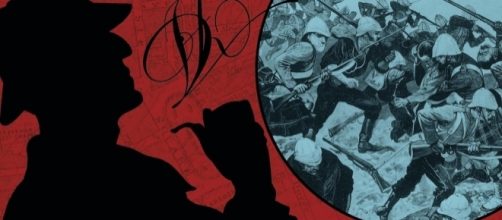Holmesian pastiches, new adventures with Conan Doyle's famous duo, are a dime a dozen. He's met Jack The Ripper, Dracula, Mr Hyde, Tarzan, solved the Titanic sinking, teamed up with Teddy Roosevelt and even fought martians, to name a few of oddball tales.
This time, franchise tie-in maestro Steven Savile (Torchwood, Primeval) and comics veteran Robert Greenberger (former editor at DC Comics), bring us an adventure set at an earlier point in the timeline, where Holmes and Watson help a distraught mother learn what really happened to her son, a soldier over in South Africa.
In the process, they discover a massive conspiracy that involves diamonds, mass fraud and the British government...
Savile and Greenberger score quickly
'Sorrow's Crown' is, refreshingly, set sometime after 'A Study In Scarlet' but before 'The Sign of Four', meaning we see a younger, less experienced Holmes and Watson than most authors use. While this may appear, at first glance, to be but surface level dressing, it actually proves a boon to the drama, as the pair can't wave their fame around and have to work a lot harder in gaining clues, especially when it comes to probing the government affairs. On top of that, they are in financial straits, affecting their mobility even further, which serves to stack the odds against them, and that's long before we get a sense of how deep the cover up runs.
It puts our heroes at a disadvantage and raises the stakes, making one want to see how they'll overcome without a lot of the tricks and bonuses of later years.
Some Watson love
Another great point: Watson gets in on the action by conducting his own inquiries, talking to witnesses and acquaintances of the soldier, as well as doing research. This not only makes the story feel closer to a proper Conan Doyle tale as we see gradually the case build and we follow the clues, but also reminds us that Holmes and Watson do work in partnership and each contributes to the other's work. A tendency among some other writers is to just have Watson react to everything, letting Holmes do nearly everything in the story, but not so here.
That's not to say the story is slow or lacking action, as Savile and Greenberger give us backstreet brawls with Indian assassins, burning buildings and a train heist involving gas. However, more of the story is spent in investigative discourse at 221B than Watson firing his revolver, and that's not even praising the amount of historical detail Savile and Greenberger have crammed into the story. The Boer wars, the Disraeli administration, conditions and practices in the armed forces, the contradiction of wealth and squalor that was Victorian London, it's a joy for a history geek like me to read and picture.
'Sorrow's' failings are more trivial
They amount, more often than not, to strange little guffs in the writing.
Watson refers to Holmes as Sherlock a handful of times in the opening chapters, thus creating some discontinuity with both later chapters and the canon, and whom the villain(s) end up being turns out to be rather mundane. Also, this is a talkier Holmes novel than some may like, especially compared to the regular Titan Holmes range, with more action-thriller tales like 'Army of Dr Moreau' and 'The Thinking Engine'.
However, thanks to terrific pacing, the level of detail and a kind of a bittersweet ending, 'Sorrow's Crown' had me eagerly turning the next page, all 304 of them flying by in no rime. Recommended.

